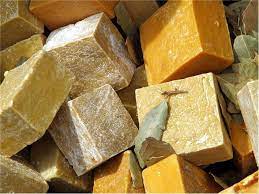Soap-like materials were being made in Babylon around 2800 BCE, in clay cylinders inscribed with the phrase “fats boiled with ashes.” Egyptians in 1500 BCE were combining animal and vegetable oils with alkaline salts for cleansing. A Roman legend claims that rainwater running down the slopes of Mount Sapo mixed animal fat and ashes, not only producing soap but giving the substance its name.
Pliny described soap as an invention of the Gauls, made from tallow and ashes. Latin sapo ("soap") may be cognate with Latin sebum ("tallow"). The physician Galen recommends soap for cleaning clothes as well as the body.
By the 7th century CE, Mediterranean countries were making soap using oil from the abundant olive trees. Naples even had a guild for soap-makers in the late 6th century. Records for Charlemagne's court list soap as a product the stewards had to account for.
Soap-making in England didn't seem to happen until the 12th century, possibly motivated by the introduction of soaps brought back by Crusaders from the Middle East. Syria, for instance, produced Aleppo soap, a green bar infused with laurel oil. This popular soap was milder and more pleasant smelling than other soaps, and inspired soap-makers to add aromatics to the mix.
Soaps are used for cleaning different things. The soaps used in the household for hand washing, etc., are called in the industry "toilet soaps." That term, as you can imagine, makes me think about medieval toilets, a topic I have never tackled (and only mentioned once) in almost 1200 posts. I think it's time to correct that omission. Stay tuned.
